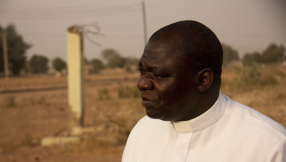It might seem like an obvious thing to say, but we Christians love a high-profile conversion narrative. An actor who's hit rock bottom and found redemption in religion; a high-flying businessman who discovered that when you get to the top there's nothing there. We don't just enjoy these stories and find our own faith enhanced by them, but we also share them enthusiastically, hoping to build up the masses and perhaps tempt other wandering sheep back to the path.
What we don't particularly enjoy is a de-conversion story, from people who have come to faith, only to decide to reject it again. We especially don't like this when the person involved is a celebrity or some other sort of public figure. We're sad of course that they've made that decision, and perhaps in some way it can fuel our own doubts, particularly if they're a person that we respect or admire. What we definitely don't want to do, is to share or give oxygen to their story, or to that alternative narrative.
I am not even going to pretend to be an aficionado of Post-Hardcore Punk music, but I'm reliably informed that if I was, the American band Underoath might play a significant role in my Spotify playlists. The band, which have existed in various forms since 1997, boast millions of fans worldwide, and are now in the process of making a major comeback after a mix of break-up and recording hiatus. In 1997, Underoath were very much known as a Christian band, and indeed in 2006, when lead singer Spencer Chamberlain was interviewed by Europunk magazine, he told a journalist that the band were Christian, 'but in a different way. We're not like your average Christian band,' before adding that faith was 'the backbone of our lives'.

Fast forward 12 years, and that's no longer true, for Chamberlain at least. In an interview with the Australian music website MusicFeeds, Chamberlain confirmed he had lost his Christian faith, and that the band would certainly no longer describe themselves as 'Christian'.
Our natural inclination might be to look away at this point, but there's more. Chamberlain's rejection of the faith wasn't just a rational but a violent one; he didn't just give into his doubts, but began to view his former religion as toxic. He told interviewer Sam Bauermeister: 'I'm not saying religion is wrong for everyone, but for me it was wrong. It [Christianity] ruined my life, turned me into a drug addict, and people were awful to me the whole time. I have never felt more alone in my life than when I was a Christian.'
Those words are painful to read, given that we usually pride ourselves as being part of the faith that sees people freed from addiction, welcomed into community, and given a fresh and positive start in life. It's deeply uncomfortable to think that following Jesus might ruin someone's life (and I don't mean in the pious sense). So what's happened here? Is it an isolated incident, of which Chamberlain was the unfortunate victim, or is it potentially a sign of a bigger problem? And what should be our response?
Though the temptation to look away is strong, I think Chamberlain's story is an important one for us to engage with. The man himself seems somehow un-consumed by bitterness, and adds in the interview that 'I'm not trying to steer people down the wrong road' and 'I'm not saying I hate Christians'. Yet his mistreatment by the church subculture – which seems to have stemmed from fans being upset about swearing in songs – was enough to see him lose his faith, even though he'd been elevated to hero status within the church.
Perhaps that's part of the problem. We elevate celebrities just as much within the church as we do outside it, and yet we don't really know what to do when they don't live up to our rather unrealistic expectations of them. In the UK, we were all hugely excited that church leader John Mumford's son had reached the charts, then felt terribly conflicted when we realised that the song had an f-word in it. More recently Stormzy, a Christian and a phenomenally prophetic voice, has drawn only cautious praise from Christians because his lyrics are similarly colourful.
This isn't just an issue about building up celebrity role models, however. Chamberlain's story, and our reaction to it, also illustrates how uncomfortable we are about stories of people leaving faith. My fear, which seems to be illustrated by this case, is that we close our eyes to these stories, and to the individuals concerned by them. If we do that, then two serious problems occur as a result.
First, people like Spencer Chamberlain become cut off entirely from the faith on which they've turned their back. There's no apology for the awful way in which he was treated, or for the dysfunctions of the subculture which became so painful. He doesn't get the chance to experience the unconditional love of the Christian community, which becomes too scared to engage with the reverse-conversion story for fear it might turn out actually to be a different kind of redemption narrative (so for what it's worth, I'm really sorry, Spencer).
Second though, it means that we never learn from our mistakes. The Christian subculture is deeply flawed, and at times can pride pharisaic puritanism over love and compassion. There are rational, theological reasons why people leave their faith behind, but there also many other reasons for which we as Christians need to take greater responsibility. At one end of that, the terrible and hideously widespread scandal of abuse; at the other, graceless behaviour which reflects nothing of a living Christ.
I'm genuinely sad that this man – whose day job doesn't particularly interest me – has found Christianity to be something that ruined his life. It seems to me though that what really hurt him and sent him spinning away from God was other Christians. We can choose to look away from that, or we can resolve not to be people who make the same thing happen to others. To do the latter takes effort, and discomfort, but is surely what a genuine faith calls us to do.
Martin Saunders is a contributing editor for Christian Today and the deputy CEO of Youthscape. Follow him on Twitter @martinsaunders.













